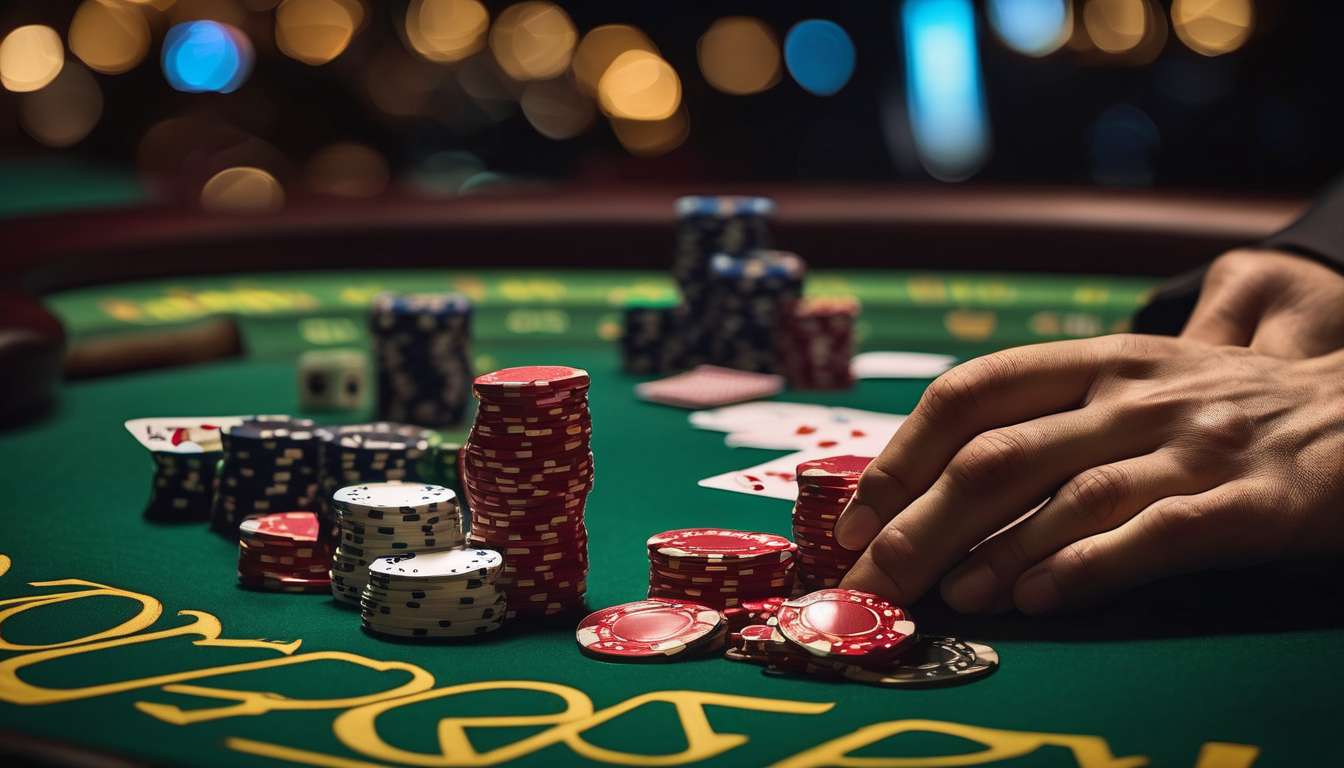When we step into the dazzling world of casinos, we are instantly enveloped by the clatter of slot machines and the anticipation hanging in the air. As avid enthusiasts and curious minds alike, we are often drawn to the theories that attempt to decode the mysteries behind our favorite games.
In this exploration, we dive into the realm of popular casino game theories, seeking to understand the strategies and beliefs that have captivated gamblers for generations. Together, we will unravel the allure of these five prominent theories, examining their origins, principles, and the extent to which they hold water in the high-stakes environment of the casino.
1. Martingale Strategy in Roulette:
- Origin: This betting strategy dates back to 18th-century France.
- Principle: It involves doubling your bet after every loss, with the belief that a win will recoup all previous losses and gain a profit equal to the original stake.
- Critique: While it seems mathematically sound, it doesn’t account for table limits and the potential for a long losing streak.
2. Card Counting in Blackjack:
- Origin: Popularized by Edward Thorp’s book "Beat the Dealer" in the 1960s.
- Principle: Players track the ratio of high to low cards left in the deck to make more informed betting decisions.
- Critique: Though effective, casinos have implemented countermeasures, and it requires significant skill and concentration.
3. Gambler’s Fallacy:
- Principle: The belief that past random events affect the probabilities of future ones (e.g., after several reds in roulette, black is "due").
- Critique: Each spin is independent, making this belief a common misconception.
4. Hot Hand Theory:
- Principle: The belief that a person who has experienced success with a random event has a greater chance of further success in the near term.
- Critique: Like the gambler’s fallacy, this theory overlooks the independence of each event.
5. Paroli Betting System:
- Principle: Also known as the Reverse Martingale, it involves increasing stakes after a win and returning to the base stake after a loss.
- Critique: It capitalizes on winning streaks but, like other systems, doesn’t alter the house edge.
Join us on this analytical journey as we dissect these concepts with a critical eye, questioning whether they truly offer an edge or merely feed into the mythos of luck and chance.
Martingale Strategy Overview
The Martingale Strategy
The Martingale strategy is a well-known betting system that involves doubling your bet after each loss. This approach aims to recover previous losses and gain a profit. Many gamblers enjoy using this method as it provides a structured approach to betting, creating a sense of camaraderie and shared understanding among those who relish the thrill of casino games.
Community and Thrill
- Provides a structured betting approach
- Fosters a sense of belonging among casino enthusiasts
- Offers the excitement of potentially outsmarting the odds
Caution: Gambler’s Fallacy
However, it is important to be wary of the Gambler’s Fallacy. This is the mistaken belief that past losses increase the likelihood of future wins, which can lead to risky decisions.
Key Considerations
-
Independence of Bets:
- Remember that each bet is independent.
- Avoid making assumptions based on past outcomes.
-
Bankroll Management:
- Be careful with how much you are willing to lose.
- Acknowledge the risks of the strategy.
Enthusiasm and Caution
Approach the Martingale strategy with enthusiasm but also with caution. Understand its potential limitations and risks to make informed betting decisions.
Card Counting Tactics in Blackjack
In the world of blackjack, mastering card counting can give us a distinct advantage by allowing us to track the ratio of high to low cards remaining in the deck.
As part of a community of strategic players, we know that card counting isn’t just about memorizing numbers; it’s about creating a sense of camaraderie in maximizing our chances. By keeping track of the cards, we can make more informed decisions that increase our odds against the house.
Card Counting vs. Other Systems:
- Unlike the Martingale system, which involves doubling our bet after a loss, card counting requires a keen eye and mental agility.
- It’s not based on the Gambler’s Fallacy—the mistaken belief that past events influence future outcomes.
- Instead, we focus on the present state of the deck, understanding that it’s a game of probability, not luck.
By sharing our experiences and strategies, we strengthen our bond with fellow players, always striving for that edge at the blackjack table.
Deconstructing Gambler’s Fallacy
Many casino enthusiasts fall into the trap of believing that a win is due after a series of losses. This belief, known as the Gambler’s Fallacy, suggests that past events influence future outcomes. However, in games of chance like roulette or craps, each spin or roll is independent. No matter how many times we’ve seen red, black isn’t "due."
Let’s talk about the Martingale strategy. It builds on the Gambler’s Fallacy by encouraging us to double our bets after every loss, assuming a win will eventually cover all previous losses.
While it sounds tempting, it doesn’t change the underlying odds and can lead to significant financial risks, especially if we hit a losing streak.
In contrast, card counting is a strategy based on actual probability shifts, not fallacies. It allows us to make informed decisions, unlike the Gambler’s Fallacy, which misguides us into false patterns.
Understanding these distinctions strengthens our casino camaraderie and strategic play.
Examining Hot Hand Phenomenon
Many players believe in the Hot Hand Phenomenon, thinking a streak of wins predicts continued success. We find camaraderie in this shared belief, feeling the thrill as our chips stack higher. Yet, we must ask ourselves: Is this feeling reliable, or is it just an illusion?
The Martingale Strategy might seem appealing when we think we’re on a winning streak. This strategy involves doubling our bets after each loss, with the hope of recouping previous losses. However, it comes with significant risks:
- Hitting a table limit
- Depleting our bankroll
Card Counting in Blackjack can also be tempting as a strategy to improve odds. However, it requires:
- Skill
- Precision
Most players may not possess the necessary expertise to execute it effectively.
The Gambler’s Fallacy warns us against the belief that past events influence future outcomes. It emphasizes that:
- Each game round is independent
- Past results do not affect future winnings
As a community, let’s stay grounded and understand that while hot streaks feel exhilarating, they’re not a guarantee of future victories.
Paroli Betting System Dissection
Let’s dive into the Paroli Betting System, a strategy that encourages us to press our bets during winning streaks for potential higher returns.
Key Features of the Paroli System:
-
Unlike the Martingale system, which doubles bets after losses, Paroli invites us to ride the wave of success by doubling only after wins.
-
This positive progression system appeals to our sense of camaraderie, creating an environment where we cheer each other’s victories.
While Card Counting in games like blackjack requires skill and precision, Paroli relies more on timing and streaks. We embrace the thrill of a hot streak, confident that our shared experiences will lead to greater rewards.
However, it’s crucial to remember the Gambler’s Fallacy, which tempts us to believe that past outcomes influence future results. In the Paroli system, we stay grounded and avoid assuming that a streak will continue indefinitely.
By understanding Paroli’s approach, we foster a sense of belonging, encouraging each other to make the most of our collective gaming experience.
Martingale Strategy Critique
Many of us have been drawn to the allure of the Martingale strategy, a system that promises to recover losses by doubling our bets after each defeat. It seems simple: keep doubling until we win, and all our losses vanish.
However, let’s acknowledge the risks:
- By believing the next win is inevitable, we may fall into the trap of the Gambler’s Fallacy, assuming past losses increase our chances of winning.
- This can lead to catastrophic losses, especially when hitting the table’s max bet limit.
Card counting in games like blackjack offers a strategic edge by keeping track of cards to predict outcomes. In contrast, Martingale doesn’t offer the same advantage. It’s a short-term fix, relying on:
- Infinite funds
- Limitless bets
Casinos are designed to counteract these assumptions.
As a community, we need to recognize that while Martingale appeals to our desire for quick recovery, it doesn’t guarantee success and often leads to more significant risks.
Let’s gamble wisely together.
Blackjack Card Counting Analysis
Let’s dive into the mechanics of blackjack card counting, exploring how this skill can tilt the odds slightly in our favor when used correctly.
Card counting involves tracking the ratio of high to low cards left in the deck. By doing this, we can make more informed betting decisions, unlike the Martingale strategy, which increases bets irrespective of the card count. Card counting doesn’t guarantee success every time, but it provides us with a strategic edge.
Key Attributes for Card Counting:
- Practice
- Focus
- Discipline
These attributes bring us together as a community of savvy players. It’s not about falling for the Gambler’s Fallacy, where we assume past outcomes influence future ones, but rather about making calculated bets when the odds are in our favor.
Benefits of Mastering Card Counting:
- Enhance your blackjack experience.
- Share tips and stories with fellow enthusiasts.
- Feel part of an exclusive club of strategic thinkers.
Unraveling Casino Game Theories
In our quest to understand casino game theories, we’ll explore how mathematical principles can influence our strategies and decisions at the gaming tables.
Martingale System:
- This strategy involves doubling our bet after each loss in an attempt to recover losses.
- While it sounds promising, it is crucial to be cautious of table limits, which could thwart this strategy.
Card Counting:
- Often regarded as the holy grail of blackjack, card counting relies on our keen observation skills to track high and low cards.
- This method can potentially give us an edge over the house.
- However, it requires practice and stealth to avoid detection by casino staff.
Gambler’s Fallacy:
- This common pitfall is the belief that past outcomes affect future events.
- It’s important to remember that each spin of the roulette wheel or roll of the dice is independent, and previous results do not influence future ones.
By understanding these theories, we can make more informed decisions, enhancing our sense of belonging within the casino’s exciting realm.
What is the history behind the development of these popular casino game theories?
We’ve delved into the intriguing history behind the development of these popular casino game theories. From their early origins to modern-day interpretations, each theory has a unique evolution that sheds light on the psychology behind gambling strategies.
Understanding this history provides valuable insights into the rationale behind these theories and how they have shaped the way players approach casino games.
It’s a fascinating journey through time and human behavior.
How do cultural differences influence the perception and application of these casino game strategies?
Cultural differences significantly impact how we perceive and utilize casino game strategies. Our diverse backgrounds shape our approach to these games, influencing our strategies and interpretations.
Understanding these cultural nuances can provide valuable insights into the effectiveness of various gaming approaches. By recognizing the diversity in gaming strategies, players and strategists can adapt and refine their methods for better outcomes.
Embracing these differences allows us to appreciate the rich tapestry of perspectives that contribute to the dynamic world of casino gaming. This appreciation not only enhances the gaming experience but also fosters a more inclusive and innovative gaming environment.
Are there any psychological factors that affect a player’s decision to choose one strategy over another?
When we consider the psychological factors influencing our choice of strategy in a casino game, various elements come into play.
Emotions can significantly sway our decisions:
- Confidence
- Risk aversion
- Superstitions
Additionally, cognitive biases may impact our choices without us realizing:
- Anchoring
- Availability heuristic
By understanding how our minds work in these situations, we can better navigate the complexities of selecting strategies in casino games.
Conclusion
So, now you’ve delved into the realm of casino game theories.
From the Martingale strategy to card counting in Blackjack, you’ve explored various tactics and fallacies.
Remember, while these theories can be intriguing, luck and chance still play a significant role in gambling.
Key Points to Keep in Mind:
- Stay informed.
- Play responsibly.
- Enjoy the thrill of the game!
Conclusion: Embrace the excitement, but always remember the importance of responsible gaming.




